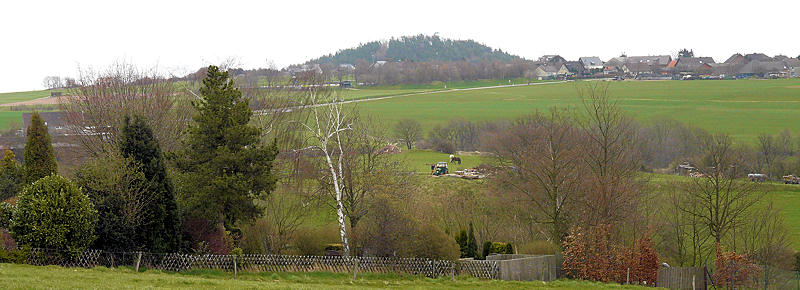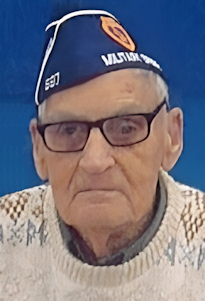Company L, 13th Infantry Regiment, 8th Infantry Division

The Battle of the Huertgen Forest was an expensive and useless fight. One of my company commanders was wounded in France and sent back to Washington and worked in intelligence area. He told me at a meeting we had after the war that the Huertgen forest battle was not necessary at all. The area could have been surrounded and isolated. Our high commanders were not so smart after all.
I was trained in the anti aircraft artillery at Fort Bliss, El Paso, Texas and served there about one year. It was decided that the German air force was not a big threat and infantry was more important.
I was sent to France to a replacement depot in Normandy in early August 1944.
After a couple of days I was put on a truck and sent down the coast toward the sea port of Brest. Our side did not have a good port to unload men and supplies. Three infantry divisions were sent down the coast to take that city. I was put in company L, 3rd battalion, 13th infantry regiment, 8th infantry division. When we got near the city my regiment was sent to the east to an area of the Crozon Peninsula.
This was an interesting move because strange things began to happen. A squad from my company (12 men) was sent on a night patrol up a small hill. They did not come back and an attack was planed for the next morning. At day break the squad came back with 150 prisoners. The next day after we had moved on, my Lt. and 3 of us was attacked by a machine gun. I was sent around the side to attack them because the others were were loaded down with equipment. They saw me and started cutting briars down all around me for a while then discarded their gun and gave up to me. A small distance further along I saw 3 germans in a fox hole that were drunk as sin. I had to threaten them with a flame thrower to get them to give up. They had thrown their guns away. We went around a hill and took their commander Major General Ramke out of a 60 foot hole in the ground. This was the surrender of the city of Brest France.
Next day we boarded a 40 or 8 box cars for Luxembourg, 40 men or 8 horses. Took us three days to get to Luxembourg City. Worst ride in my life and the only time off I had in Europe. This was middle of September 1944.
We moved the northern part of Luxembourg and stayed in an area in Belgium and crossed into Germany October 1, 1944.
Our activity in the area was very low and was only patrolling until we moved into the Huertgen Forest, mid November near Germeter, Germany. This was a hell hole and the Germans would rain artillery down on us through tree bursts and it was one patrol after another. On one patrol my squad accompanied an intelligence squad through the lines on our way back. I was the last man in a single line going from one tree area across an opening about 30 yards wide. Some one fired a shot in the front line. We hit the ground. The man in front of me lost contact with the person in front of him. I looked up the hill and a German officer walked out of the trees. He walked a few paces and waved his arm and nine more came out and all started walking straight at me. That officer walked within 20 yards of me looking straight at me, made a 90 degree right turn and all of his men followed and made no attention to me. I could have killed all of them with my automatic rifle but I was in their back yard and had lost my patrol and was not about to start a fight in their house.
On December 8th, my company was sent to Bergstein. We walked all day and half the night to relieve the 2nd Ranger Battalion. They had been sent 2 days prior to clear the high knob (Hill 400) beyond the village. We were there until early February 1945. All through the battle of the Bulge we were attacked at least twice a day by different size forces and every few minutes by mortars and artillery.
One morning before daylight I was standing in the front door of the house that is near the knob and I could see two Germans going toward the church. I shot them, or thought I had. After a few minutes they had moved in front to the pill box and took a shot at me with a bazooka knocking me down the stairs into the basement. That aroused all my squad and we never did get them. I had missed them which was unusual for me because I was very good with a gun back then. I was raised on a farm in West Virginia and hunted a lot.
Bergstein was a constant battle because it was high up 400 meters high and key terrain.

Bergstein & Hill 400, view from Brandenberg
We moved off the hill in February and crossed the Roer River and attacked the city of Düren. In Duuml;ren I lost 5 men from one artillery shell.
We proceeded across the Cologne plains to the Rhine River and crossed just out of Bonn.
We proceeded up the Sieg River to Siegen. After taking that city we moved up on a mountain outside the town. I took a patrol out to the end of the mountain but did not see any thing. We took a full squad out there later to form a listening post and ran into a large group and had a heavy fire fight. I had my rifle shot out of my hands at close range I think I killed 4 of them but they put me out of business.
My right thumb is gone. They missed my nose by about one inch. I had 5 or 6 wounds before that but they were miner.
November 2009

In remembrance of William Aaron Pritt
March 8, 1925 - † October 17, 2016

